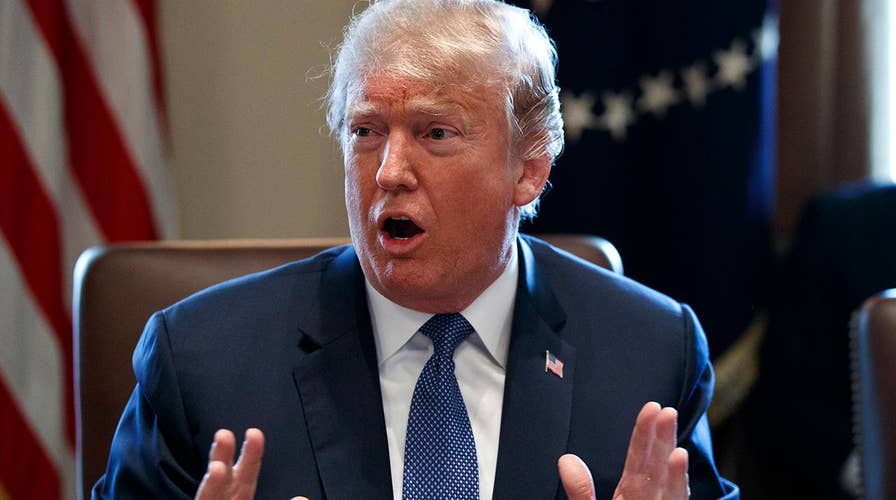Trump signals US military response to Syria is imminent
President says all options are on the table as he weighs U.S. retaliation for suspected gas attack in Syria; Kristin Fisher reports from Washington.
Over the weekend, another suspected chemical attack was carried out in Syria killing dozens of innocent people. Horrifying images of young women and children shaking and suffocating to death while doctors desperately tried to save them were splashed across our television screens.
This attack, along with the recent bombings in Eastern Ghouta that killed an estimated 1,600 civilians since February of this year, are a heart-breaking reminder of the catastrophic human toll that has accumulated over the course of the war in Syria.
What started as a series of violent crackdowns on demonstrations in 2011-- by a diabolical dictator-- quickly ballooned into an all-out civil war. Since this disastrous conflict began, it is estimated that almost 500,000 people have been killed while 5.5 million people fled the country and are living as refugees.
Conflicts of this magnitude create fertile ground for jihadists to plant their seeds. In this kind of environment extremism is born, radicalism thrives, and terrorism spreads.
Today, Syria is not just a country set ablaze by internal divisions; it is an epicenter of war where many world powers are staring each other in the face. Russia, Iran, Turkey, Lebanon, Saudi Arabia, Israel, the United States, and several European countries are involved and all of them are searching for a different “road to Damascus.”
For a bloody battle that seems far from over, many are wondering what role the United States can play in helping facilitate a conclusion to this conflict. While limited, options remain available.
First, if it is confirmed that the Assad regime was behind the latest chemical attack, the United States, the U.K, France, and other allies need to work together and carry out a bold and swift response. The civilized world cannot allow these heinous attacks to go unanswered.
When President Obama drew his red line in the sand after a chemical attack in 2013, he chose to turn his back and walk away from it.
Instead of responding forcefully, he dispatched Secretary of State John Kerry to negotiate a deal with Russia to remove Syria’s chemical weapons stockpile. Based on the repeated use of chemical weapons to target and kill civilians, that deal has proven to be a colossal failure.
The Administration should put all options on the table including military strikes similar to the Tomahawk missiles that successfully struck several targets inside Syria last year following a Sarin gas attack that killed over 70 people. The use of weapons of mass destruction must never be tolerated.
This time, President Trump and his team should consider hitting a greater number of military installations to severely degrade Assad’s ability to launch these immoral and illegal attacks from the air. This would send a clear-cut message to the regime.
Second, Iran and Russia also have blood on their hands as they have been partners in carrying out these atrocities. They must not be left off the hook. Both countries need to be subject to additional economic and diplomatic penalties for propping up Assad, sponsoring terror, and supporting other destabilizing actions in the Middle East.
In the House of Representatives, I have already taken steps to squeeze the Iranian regime by introducing bipartisan legislation that sanctions government officials for hostage taking, corruption, and human rights abuses. I also introduced legislation that sanctions the Islamic Revolutionary Guard Corps (IRGC) for its support for terrorism and for its ongoing ballistic missile development. If enacted into law, these actions could help force Iran to retract its tentacles of terror.
Finally, we must remain focused on destroying ISIS. Our chief objective in the region must be to make sure they are not able to re-acquire the land they once held. A previous premature withdrawal of American forces from Iraq allowed Abu Bakr al-Baghdadi to lead an army of savages to brutalize cities and kill tens of thousands of people.
The world was left in shock as we witnessed the gruesome executions carried out by ISIS. Some were burned alive and others, including Americans, were beheaded on camera.
Because the desire to kill is their guiding inspiration, we must make sure ISIS is not able to regain strength. Another early exit could breathe new life into the embers that remain lit before this bloodthirsty fire can be extinguished.
There are many factors that will contribute to this endeavor, but none are as powerful as the American military. We have crushed the caliphate. Now it is time to crush their spirit. Only when the Pentagon feels we have succeeded should we begin to withdraw our forces. At that time, Arab states, the UN, and other partners in the region will have to take on more responsibilities. We cannot continue to occupy foreign countries indefinitely.
For many decades, war in the Middle East and threats from terrorists have seemed all too common. There is no doubt that we are faced with very serious challenges. However, I believe that if we implement the steps I have outlined, we will strengthen the security of our homeland and make the world a safer and more peaceful place.

